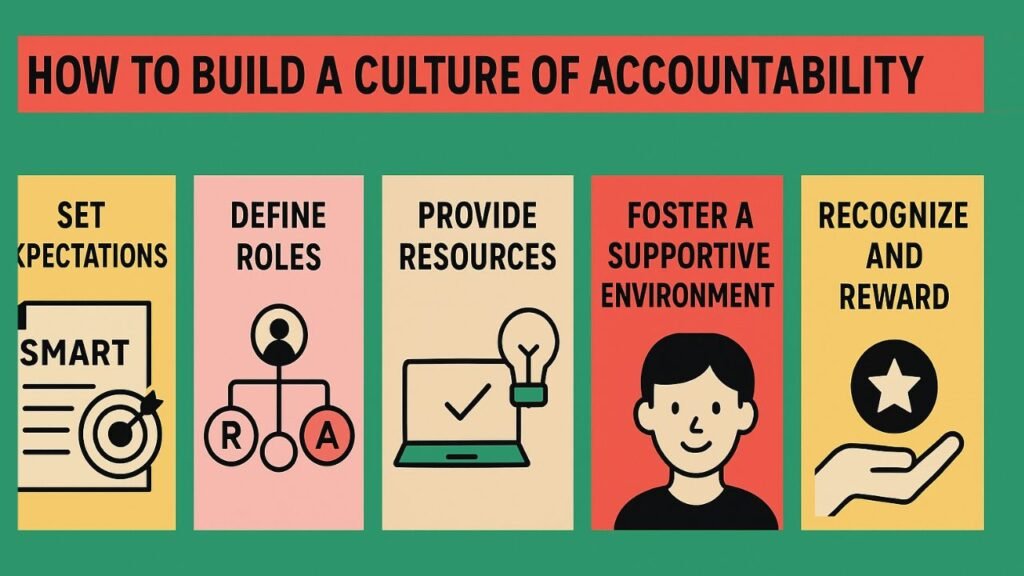Creating a culture of accountability in your organization isn’t just about rules and checklists. It’s about building an environment where people want to take ownership. When accountability is ingrained in your team’s DNA, productivity goes up, trust strengthens, and performance hits a new level.
Let’s break down what actually works, no fluff, just actionable strategies that align with how high-performing teams operate in the real world.
Set Expectations That Are Crystal Clear
Vague goals? They lead to confusion and missed targets. The very first step toward accountability is setting expectations that leave no room for ambiguity.
Use SMART Goals for Clarity
The SMART framework stands for Specific, Measurable, Achievable, Relevant, Time-bound. This isn’t just corporate jargon. It’s practical. When you define what success looks like, people know what they’re aiming for. I’ve seen teams go from scattered to laser-focused just by tightening up their goal-setting approach.
Say your goal is to “increase sales.” That’s too broad. A SMART version might be:
“Increase monthly B2B sales by 15% over the next quarter by focusing on existing accounts and upselling services.”
That gives direction and a timeline. Now you’ve got something people can work toward.
Define Roles So There’s No Finger-Pointing Later
Accountability thrives when everyone knows exactly what they’re responsible for. When tasks get lost in the gray area between two people or departments, that’s when things fall apart.
Try the RACI Matrix
The RACI model stands for Responsible, Accountable, Consulted, Informed that is a great tool to map out who does what. You don’t need to make it over-complicated. Just make sure each project or process has clearly assigned owners.
Empower Teams With the Right Tools and Support
One of the most overlooked aspects of accountability is support. If someone doesn’t have the resources they need, even the best intentions fall flat.
Invest in Tools That Drive Visibility
Project management platforms like Trello, Asana, or Monday.com aren’t just “nice to have.” They give real-time updates, help track progress, and make collaboration easier. If your team is remote or hybrid, these tools are almost non-negotiable.
Keep Feedback Loops Active
Regular check-ins, one-on-ones, and performance reviews aren’t micromanagement. They’re opportunities to course-correct, support growth, and keep goals on the radar. Just make sure it’s a two-way street: managers should listen as much as they talk.
Foster a Culture Where Accountability Isn’t Scary
Here’s the thing: accountability shouldn’t feel like punishment. If people fear being blamed, they’ll start hiding mistakes instead of learning from them.
Normalize Ownership, Not Perfection
Create an environment where owning up to a misstep is met with coaching, not consequences. When teams feel psychologically safe, they’re far more likely to take initiative and that’s when accountability really sticks.
Recognize and Reward Accountability
People want to be appreciated. It’s human nature. And when someone consistently steps up, they deserve more than just a silent nod.
Recognition Can Be Simple or Serious
A quick shout-out in a team meeting, a personalized thank-you email, or a spotlight in your company newsletter can do wonders. For bigger wins, tie accountability to tangible rewards include bonuses, raises, or even career growth opportunities.
In one company I worked with, monthly peer-nominated awards for accountability totally changed the culture. Suddenly, team members were holding each other to higher standards in a good way.
Final Thought: Accountability Is Built, Not Demanded
If you want your team to be truly accountable, it won’t happen overnight. But with a foundation of clarity, support, recognition, and trust, you’ll build a workplace where accountability isn’t enforced, it’s embraced.
FAQs on Building a Culture of Accountability
Q: Is accountability the same as micromanagement?
No. Accountability is about ownership, not control. It means people understand what they’re responsible for and are trusted to deliver results.
Q: What’s the biggest reason accountability fails?
Lack of clarity. If people don’t know what’s expected or who’s in charge they can’t be held accountable for much.
Q: Can accountability be taught?
Absolutely. Like any skill, it grows through consistent habits, honest communication, and strong leadership.
